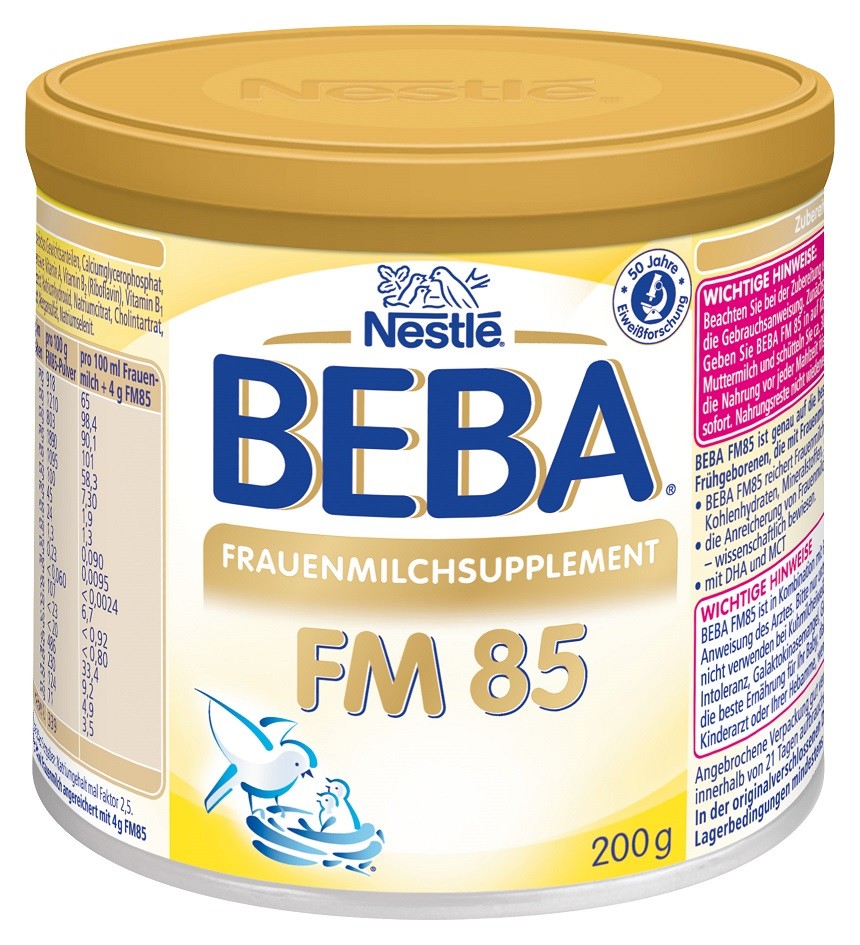Nestle
BEBA EXPERTpro FM 85 Baby Formula FM85 - 200g
BEBA EXPERTpro FM 85 Baby Formula FM85 - 200g
Couldn't load pickup availability
BEBA EXPERTpro FM 85 is a food for special medical purposes. Intended for controlled dietary nutrition for premature babies to support their growth, with hydrolyzed whey protein, medium-chain triglycerides (MCT) and nutrient content according to current recommendations.
Nestlé BEBA EXPERTpro FM 85 is intended exclusively for use with breast milk . For use from birth on the recommendation of a doctor. Nestlé BEBA EXPERTpro FM 85 should be administered under medical supervision.
The package contains 200 g.
Dosage and method of use
Follow the preparation instructions exactly. Always wash your hands thoroughly before preparing the formula. Add Nestlé BEBA EXPERTpro FM 85 to breast milk warmed to body temperature and shake well for 30 seconds. Prepare just before feeding and feed immediately. Discard any unused portion of the fortified milk.
- Prepare all feeding equipment (bottle, syringe, or enteral feeding container) just before feeding.
- If you use frozen breast milk, thaw it slowly in the refrigerator (below 4°C). Do not thaw in the microwave or at room temperature.
- Shake or stir before pouring into the feeding container.
- Pour only the required amount of breast milk to be fortified into the feeding container.
- Warm breast milk to body temperature before adding Nestlé BEBA EXPERTpro FM 85. DO NOT use a microwave.
- Add the required amount of Nestlé BEBA EXPERTpro FM 85 to lukewarm breast milk (35-40°C) and use the standard preparation procedure (1 g per 25 ml of breast milk) or the specifically calculated amount in case of different prescribed fortification. Use only the enclosed measuring cup and level the powder against the edge of the can.
- Shake gently until the powder is completely dissolved. FEED IMMEDIATELY.
- Discard any unused portion of fortified milk after each feeding.
- After preparation, close the can tightly with the lid.
Composition
Hydrolyzed WHEY proteins , maltodextrin, medium-chain triglycerides (coconut and palm kernel fat in various proportions), low-erucic rapeseed oil, calcium glycerophosphate, calcium salts of phosphoric acid, potassium hydroxide, FISH oil , vitamins (sodium L-ascorbate, DL-α-tocopherol acetate, nicotinamide, calcium D-pantothenate, retinyl acetate, riboflavin, thiamine mononitrate, pyridoxine hydrochloride, folic acid, phylloquinone, cholecalciferol, D-biotin, cyanocobalamin), magnesium chloride, calcium chloride, sodium hydroxide, sodium citrate, choline bitartrate, sodium chloride, ferrous sulfate, acidity regulator (citric acid), inositol, L-carnitine, zinc sulfate, taurine, copper sulfate, potassium iodide, manganese sulfate, sodium selenite.
Allergy warning: Contains cow's milk protein and fish oil.
| Nutritional information | per 100 g | per 4 g powder |
|---|---|---|
| Energy | 1821 kJ | 73 kJ |
| Fats | 18.1g | 0.7g |
| - of which saturated fatty acids | 10.9g | 0.4g |
| medium-chain triglycerides (MCT) | 12.5g | 0.5g |
| docosahexaenoic acid (DHA) | 0.2g | 0.008g |
| Carbohydrates | 32.4g | 1.3 grams |
| - of which sugars | 2.1 grams | 0.1g |
| Proteins | 35.5g | 1.4 grams |
| Salt | 2.3 grams | 0.09g |
| Mineral substances: | ||
| Sodium | 918 mg | 37 mg |
| Potassium | 1210 mg | 48.4 mg |
| Calcium | 1890 mg | 75.6 mg |
| Phosphorus | 1095 mg | 43.8 mg |
| Magnesium | 100 mg | 4 mg |
| Manganese | 0.23 mg | 0.0092 mg |
| Selenium | 107 μg | 4.3 μg |
| Iron | 45 mg | 1.8 mg |
| Iodine | 486 μg | 19.4 μg |
| Copper | 1.3 mg | 0.052 mg |
| Zinc | 24 mg | 0.96 mg |
| Chlorides | 803 mg | 32.1 mg |
| Fluorides | <0.060mg | <0.0024 mg |
| Chrome | <23 μg | <0.92 μg |
| Molybdenum | <20 μg | <0.80 μg |
| Vitamins: | ||
| Vitamin A | 8320 μg | 333 μg |
| Vitamin D | 88 μg | 3.5 μg |
| Vitamin E | 94 mg | 3.8 mg |
| Vitamin K | 188 μg | 7.5 μg |
| Vitamin C | 469 mg | 19 mg |
| Vitamin B1 | 3.5 mg | 0.14 mg |
| Riboflavin | 4.7 mg | 0.19 mg |
| Niacin | 35 mg | 1.4 mg |
| Osmolarity 339 mOsm/L |
Notice
Not intended for parenteral use. Not suitable as the sole source of nutrition and not a substitute for breast milk. Not suitable for infants with allergy or intolerance to cow's milk protein, galactosemia, congenital lactose intolerance, galactokinase deficiency, glucose-galactose malabsorption or maltose intolerance.
Share






